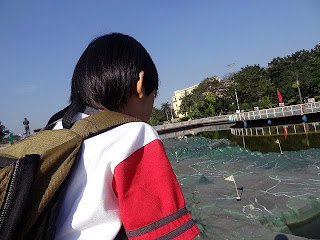What is extraordinary--to me at least--about this photo is that we were inside a hippopotamus' open mouth. I think millions of Filipino children must have posed for a picture inside that particular hippo's mouth at least once in their childhood. It was dirty in there, stank of urine, and had graffiti on the walls. Yet we smiled and were genuinely happy.
That old hippo lives inside the Children's Playground in Rizal Park where my parents brought me dozens of times on sunny weekends when I was growing up. Now that it's my turn to raise a kid, I have always felt a bit of shame for not being able to bring my son to meet the hippo with the funky smell.
Shame because once upon a time, it became my smiling place with my father.
***
He usually wakes up at 6:00 a.m., on good days. We would spend a bit of time engaged in conversations like this:
Me: Wake up, sweetie. You'll be late for school.
Him: You were the one who made me sleep, so you make me wake up.
Me: Okay, which button should I press to wake you up?
(I try several buttons: ear, tummy, armpit, nape.)
Him, squealing and giggling now: No, not those buttons!
This goes on for about 15 minutes, after which he would be alert enough to go and brush his teeth and so on, until he is ready to walk through the front door at 7:30 a.m. to jump into Mr. Fulgencio's waiting Strada.
This morning, however, is different. First, Mr. Fulgencio won't be picking him up. Second, the usual morning hustle got extended as every single movement happened in slow mo. We left the house thirty minutes later than usual. Still we walked sloowly, feeling each soft step and basking in the glowing 8:00 a.m. sunlight.
I heard a strange bird calling and had to stop to visually scan the trees. We analyzed the cirrus formations and talked about the many possible "reasons for tardiness" to write down later on his late slip.
"Just write, We bought water," I tell him.
"How do you spell bought?" he asks.
"You can spell it any way you like," I say, waving to the guard on duty at the subdivision entrance.
We actually bought a big bottle of drinking water from 7-11, and then we hailed a cab. I should have said "E. Rodriguez" to the driver, because "E. Rodriguez" is the right thing to say when you find yourself in a cab with your child and it's a school day and you are, actually, supposed to be on your way to school.
But I didn't. I said, "Luneta."
* * *
Sometimes--not all the time--but sometimes, children learn more about life outside the classroom than when they are in it. I believe this is why parents need to become impromptu mothers and fathers once in a while.
With wide eyes, they would question you: "I'm skipping school??" (Stress on the word skipping.) And with as much maturity as you can muster, you would reply: "Yes."
That day, in Luneta, my child learned things that he couldn't have learned sitting at his desk inside a small school room. It was such an unsophisticated destination (Luneta, where the maids hang out on their day off), and we spent only P70 (for the park entrance and calesa ride), but I rest with certainty that my boy will remember the trip for the rest of his life. In the same way that I still cherish that short moment I spent with my father inside the mouth of a hippo.
(This essay was published on Rappler: http://www.rappler.com/life-and-style/20531-familysunday-the-impromptu-parent)

Looking at the relief map of the Philippines

There is a little boy who lives in a shoe :)

He knew all of the creatures by name...

...and climbed each and every one of them




Feeling Steve Irwin








Bowi and Lapu-Lapu!

Bowi took this picture of me.

Short ride in the calesa.


It was hot and we got tired from all the walking. Time for orange juice.




